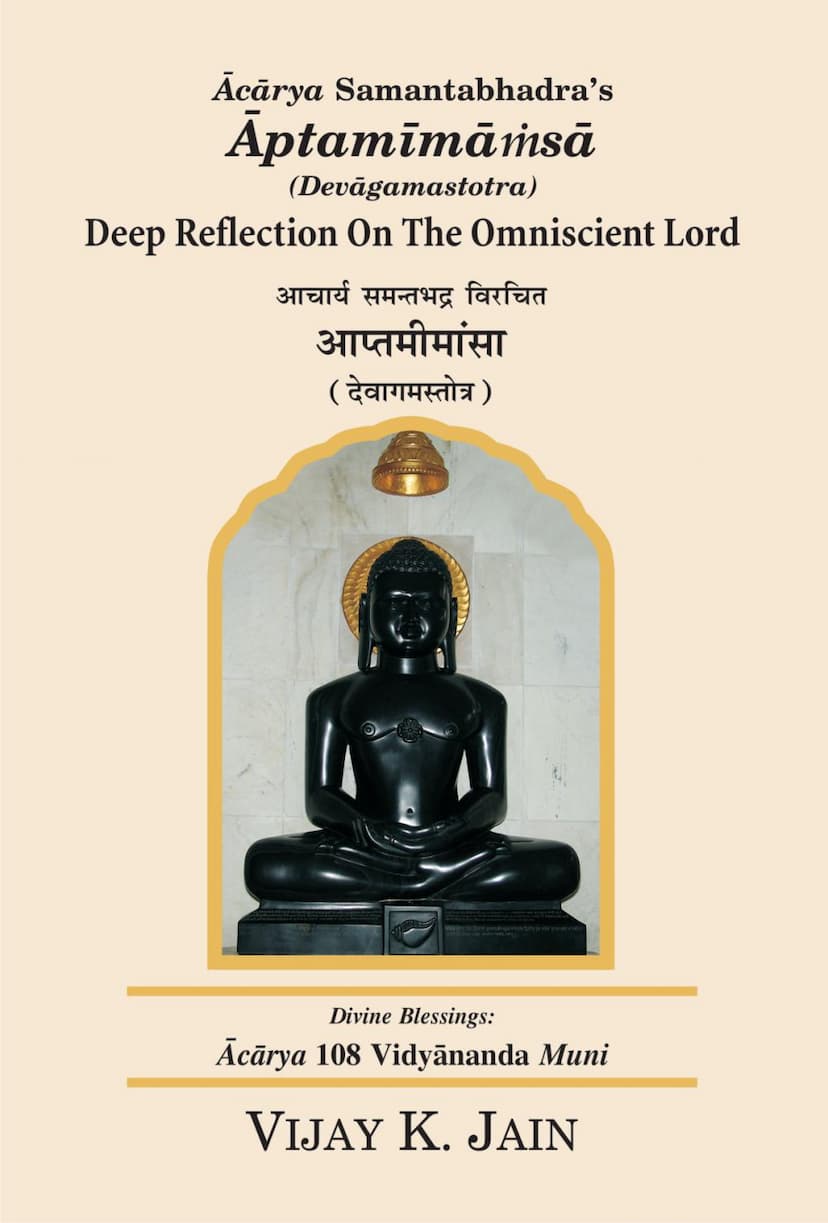Aptamimansa
Added to library: September 1, 2025

Summary
Here's a comprehensive summary of the Jain text "Aptamīmāṁsā" by Ācārya Samantabhadra, based on the provided content:
Title: Āptamīmāṁsā (also known as Devāgamastotra) - "Deep Reflection On The Omniscient Lord" Author: Ācārya Samantabhadra Translator/Commentator: Vijay K. Jain Publisher: Vikalp Printers (2016)
Core Purpose: The Aptamīmāṁsā is a profound philosophical and logical treatise that critically examines the attributes of an ideal object of worship or veneration, particularly within the Jain tradition. Its primary aim is to establish the supremacy and trustworthiness of the Omniscient Lord (Jina or Arhat) as the ultimate authority on truth. It does this by dissecting and refuting various philosophical viewpoints that fall short of this ideal.
Key Themes and Arguments:
-
Defining the "Apta" (Trustworthy Authority):
- The text begins by questioning what truly makes an entity worthy of worship or considered an authority.
- It argues that superficial qualities like the attendance of celestial beings, miraculous powers, bodily perfections, or even the founding of a religious sect are not sufficient grounds to establish someone as an "Apta." These attributes can be found even in illusionists or founders of contradictory sects.
- The true mark of an Apta is the possession of perfect knowledge (omniscience, kevalajñāna) and the absence of all defects or imperfections (doṣa), which are caused by the destruction of obscuring karmas.
-
Establishing Omniscience:
- The text logically demonstrates the possibility of attaining omniscience by showing that knowledge of subtle, distant, and past/future objects is attainable through inference and ultimately through direct perception by an omniscient being.
- The Omniscient's pronouncements (vāk) are validated by their consistency with both reason (yukti) and scripture (śāstra), meaning they are not contradictory to established knowledge.
-
Critique of Absolutist Philosophies:
- A significant portion of the Aptamīmāṁsā is dedicated to refuting various absolutist philosophical standpoints (ekānta) prevalent at the time. These include:
- Bhavaikānta (Absolute Existence): Denies non-existence, leading to paradoxes of eternal and all-pervading substances.
- Abhāvaikānta (Absolute Non-existence): Denies existence, leading to nihilism and the impossibility of knowledge or valid speech.
- Advaita-ekānta (Absolute Non-dualism): Denies the reality of dualities (like cause and effect, agent and action, merits and demerits), making concepts like karma, bondage, and liberation impossible to explain.
- Pṛthaktva-ekānta (Absolute Separateness): Denies the interconnectedness of things, leading to problems in explaining series, aggregates, and the relationship between substances and their attributes.
- Nityatva-ekānta (Absolute Permanence): Denies change and modification, making knowledge acquisition and the process of liberation impossible.
- Kṣaṇika-ekānta (Absolute Momentariness): Denies continuity and permanence, making concepts like memory, recognition, and the cause-effect relationship untenable.
- Dependence on Fate vs. Human Effort: Rejects the exclusive reliance on either fate (daiva) or human effort (pauruşa), advocating for their combined role depending on the nature of the action (premeditated vs. unpremeditated).
- Absolute views on Pain/Pleasure and Karma: Critiques the idea that all pain necessarily leads to merit and all pleasure to demerit, or vice versa, without considering the underlying dispositions and intentions.
- Ignorance as the sole cause of Bondage: Argues that ignorance along with delusion causes bondage, not just ignorance alone. Similarly, liberation is attained through knowledge free from delusion.
- External vs. Internal Reality: Critiques philosophies that exclusively prioritize either external objects (bahyārtha) or internal cognition (antaranga artha), asserting that true knowledge requires an interplay between both.
- A significant portion of the Aptamīmāṁsā is dedicated to refuting various absolutist philosophical standpoints (ekānta) prevalent at the time. These include:
-
The Jain Alternative: Anekāntavāda and Syādvāda:
- The text champions the Jain doctrine of Anekāntavāda (non-absolutism or manifoldness of reality), which asserts that reality has infinite aspects and can only be understood by considering multiple viewpoints.
- Syādvāda (the doctrine of conditional predication) is presented as the logical framework for expressing Anekāntavāda. It uses the qualifier "syāt" (in a way, from a certain viewpoint) to qualify assertions, allowing for seemingly contradictory attributes (like existence and non-existence, permanence and momentariness) to coexist within a single entity when viewed from different perspectives.
- The saptabhangi (seven-nuance system) is a practical application of Syādvāda, illustrating how seven statements can describe the complex nature of reality.
-
The Nature of Knowledge and Reality:
- The text clarifies that true knowledge (pramāṇa) arises from valid sources, whether it's direct omniscience (kevalajñāna) or valid indirect knowledge derived from reason (hetu) and scriptural authority (āgama).
- It emphasizes that an object of knowledge (prameya) has both general (sāmānya) and particular (viseṣa) attributes, and both substance (dravya) and mode (paryāya), which are inseparable yet distinct.
- The true nature of reality is understood through the combination of these various perspectives, not through exclusive, absolutist claims.
Contribution of Vijay K. Jain: The book represents Vijay K. Jain's significant effort in translating and elaborating on Ācārya Samantabhadra's original Sanskrit text. This work makes the complex philosophical arguments accessible to a global audience, allowing for a deeper understanding of Jain principles. The publication is noted for its clarity and scholarly approach, building upon the rich tradition of Jain philosophical discourse.
Overall Significance: Aptamīmāṁsā is a foundational text in Jain philosophy, meticulously constructing a logical argument for the Jina as the supreme authority and refuting alternative, absolutist viewpoints. It highlights the Jain emphasis on non-absolutism, conditional predication, and the interconnectedness of reality, offering a path to true knowledge and liberation.